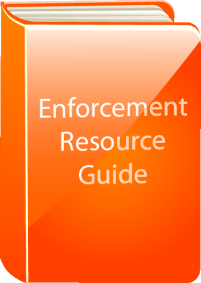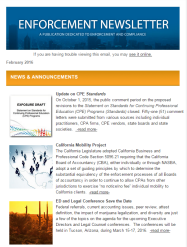Enforcement NewsletterFebruary 2016The Enforcement Resource Guide (ERG) divides the enforcement process into nine basic components. In this newsletter, we will focus on Component 9: Monitoring Provisions & Sanctions.
Monitoring provisions include the system or procedures of tracking the terms of a final Board order. This would include provisions within a sanctioning agreement, probation, stayed suspensions, and practice restrictions. The process is designed to ensure compliance throughout the term of the sanction and to ensure sanctions are lifted when all provisions are met or additional sanctions are imposed when terms are not met. In most cases, CPAs voluntarily agree to sign a Consent Order or Consent Agreement with the Board to settle their matters by mutual agreement or become subject to a final order as a result of an investigation of alleged wrongdoing while they are licensed. Typically, the staff assigned to monitor compliance with the Consent Order or Final Order will be provided electronic versions of all the terms of compliance. The monitor will download the orders and place them in a separate monitoring file. The monitoring files are of three types: probation, limited scope, or remedial compliance. CPAs on suspension have a set period of time during which they cannot perform services, such as two years. CPAs with probationary status or conditional practice are subject to practice limitations, required to perform affirmative acts, or both. They may not be able to perform certain attest services and/or they may be required to have their attest services pre-approved by another CPA before issuance. Remedial compliance requires only that the CPA perform certain acts, such as taking an ethics course. When the acts have been completed, the person is no longer monitored. The monitor will create a system by which to track compliance with the Orders. Most Boards utilize an electronic tickler system or a spreadsheet that allows the staff to confirm compliance along with details such as fees, penalties, continuing professional education (CPE), pre-issuance review, and other reporting requirements. Due dates will be computed for each of these requirements. The charts will be consulted on a monthly basis to determine the required responses from each CPA being monitored. It is the responsibility of the CPA to comply with ordered provisions. The Board may, but is not required to, send a reminder letter for submission of an ordered provision. The letter should include language indicating the ultimate responsibility for compliance falls to the licensee. If the Board does not provide a reminder to the CPA, it shall not excuse the CPA’s timely compliance with ordered provisions. The Board may acknowledge receipt when the CPA pays a fee or penalty, provides other requirements such as CPE, affidavits, a pre-issuance report or other monitoring materials as required. If the CPA fails to comply with any of the provisions as ordered by the Board, the staff monitoring the matter will bring the violation to the Board’s or its assigned staff person’s attention. The Board then has the ability to impose harsher sanctions, lengthen the probation or suspension terms, or revoke the licensure. If you have any information or samples you would like included in the Guide, please forward them to Stacey Grooms at [email protected]. The Enforcement Resource Guide is available to current executive directors and members of Boards of Accountancy through NASBA.org. Any questions regarding the guide should be directed to Stacey Grooms at [email protected]. |
Full Newsletter |








